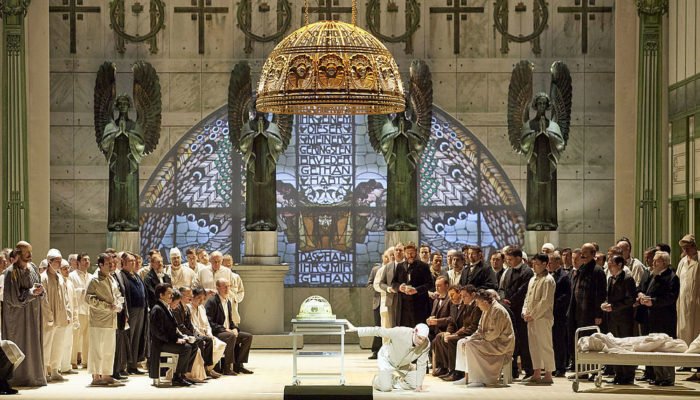
Parsifal, 2013 – Streaming on 14 April, 12:00 to 16 April, 12:00.
Michael Schulz, Director · Alexander Polzin, Stage and Costume designer
With Milcho Borovinov, Wolfgang Koch, Johan Botha, Stephen Milling and Michaela Schuster.
From 14 to 16 April, the Salzburg Easter Festival will be showing free videos of the opera productions from the era of Christian Thielemann/Staatskapelle Dresden from 2013 to 2017.
To hear Christian Thielemann conduct the Dresden Staatskapelle in Wagner’s ‘stage consecration play’, in Salzburg at Easter, proved a musical experience that could only deepen anybody’s love of this extraordinary opera. To see it was another matter, as it often is. But let us first praise the musicians who, guided by their conductor, gave it wings.
At six minutes under four hours (battle-hardened Wagnerians will appreciate the timings) this was not a long Parsifal. By the standards of, say, Reggie Goodall, whose celebrated recording four decades ago clocked in at nearer five hours than four, it was something of a gallop, though it never felt like that, even when Thielemann, who is not exactly Billy Whizz, launched the prelude with a propulsion that felt perhaps a shade too urgent.
There is time, and there is Wagner time. Thielemann did not dissolve its bonds, any more than Newton or Einstein could, but he did establish the repose that makes this opera seem like the still point of the turning world. The rapture was there, too, in a stunningly achieved transition into the Good Friday music. That third act, surely the greatest act composed for the stage by any human hand, was magnificent.
Eleven years ago, when Claudio Abbado conducted this opera at the festival, the music sounded at times more like Debussy than Wagner. Thielemann found the translucency, of course: without that quality it wouldn’t be Parsifal. But the Dresden orchestra is a very different beast to the Berlin Philharmonic. Famous for its dark string tone — ‘burnished’ is usually the word — it was the woodwind section that caught the ear here. In particular the oboe and cor anglais sounded as if the instruments had just been carved from the wood of a Saxon forest.
Being an opera orchestra, of course, they know instinctively how to support the singers who, led by Stephen Milling’s Gurnemanz, were pretty good. That has not always been the case at recent Easter Festivals. Simon Rattle’s Ring cycle, while musically distinguished, was extremely loud and the Salome two years ago proved an unfortunate exercise in how to make sure the singers were not heard at all. In Parsifal every word could be heard.
Thielemann and his players were greeted with rapture, and quite rightly. Having taken over this year as the resident orchestra at this festival, after the Berliners decamped to Baden-Baden, their music-making had exceptional merit. Salzburg has endured some rocky moments in the past decade but the mood this year was harmonious. Full marks to Peter Alward, the English intendant, who was entrusted with the task of reshaping the festival after a financial scandal, and who had then to deal with the Berliners’ defection. Perhaps they have turned a corner.
Where directors are concerned there is not much that an intendant can do, and in any case Alward inherited this production, by Michael Schulz. The first act wasn’t bad. Two dozen perspex cylinders, filled with dry ice, served as pillars in the knights’ temple, and if they did summon images of Spinal Tap (though nobody got trapped in one of the cylinders), and if the knights looked as if they had all been dipped in flour, at least there was a sense of community.
But, oh dear, it went downhill after that with skates on. Klingsor’s magic garden was neither magical nor a garden, and the flower-maidens have rarely looked less seductive. Dressed up either as dolly birds with mini-skirts and knee-height boots, or as frumpy housemaids in dismal frocks, they made a sorry bunch as they cavorted round the statuary that cluttered up the stage. There was also a simian dwarf who acted as Klingsor’s assistant.
Schulz’s idea, and Thielemann’s, it should be noted, was to have Wolfgang Koch double up as Amfortas, the wounded leader of the Grail community, and Klingsor, the evil magician who wounded him. So the poor chap was never off stage. There is no dramatic reason for this, or if there was, it was never evident. Koch’s is not a beautiful voice and by the end of the evening whatever sheen it had was beginning to come off. Oh, and the knights piled up their dead in the final act so that the stage was filled by grey cadavers who were restored to life when Johan Botha’s Parsifal revealed the grail and Kundry (Michaela Schuster) knelt at the feet of a Christ-like figure who was, as I’m sure you guessed, blindfolded.